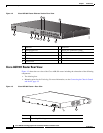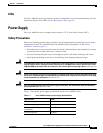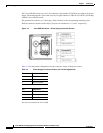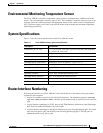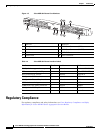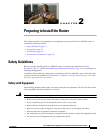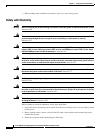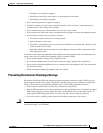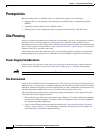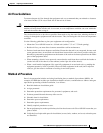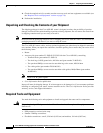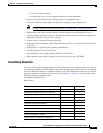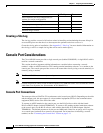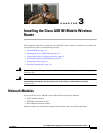
2-4
Cisco ASR 901 Series Aggregation Services Router Hardware Installation Guide
OL-23778-01
Chapter 2 Preparing to Install the Router
Prerequisites
Prerequisites
Before installing the Cisco ASR 901 router, it is important to prepare for installation by:
• Preparing the site (site planning) and reviewing the installation plans or method of procedures
(MOPs).
• Unpacking and inspecting the Cisco ASR 901 router.
• Gathering tools and test equipment required to properly install the Cisco ASR 901 router.
Site Planning
Ideally, you should have prepared the installation site beforehand. As part of your preparation, obtain a
floor plan of the site and the equipment rack where the Cisco
ASR 901 router would be housed.
Determine the location of any existing routers and their interconnections, including communications and
power. Following the air flow guidelines (see the
“Air Flow Guidelines” section on page 2-5), ensure that
adequate cooling air is provided to the router.
All personnel involved in the installation of the router including installers, engineers, and supervisors
should participate in the preparation of a Method of Procedure (MOP) for approval by the customer.
Power Supply Considerations
Check the power at your site to ensure that you are receiving clean power (free of spikes and noise).
Install a power conditioner if necessary (see the
Power Supply, page 1-5 for power requirements).
Warning
This equipment is designed for connection to TN and IT power systems.
Statement 16
Site Environment
Install the Cisco ASR 901 router in an equipment rack. The location of your router and the layout of your
equipment rack, or wiring room are extremely important considerations for proper operation. Cramped
equipment, inadequate ventilation, and inaccessible panels can cause malfunctions and shutdown, and
can make maintenance difficult. Plan to access the front and rear panels of the router.
Take the following precautions for an acceptable operating environment for your router and to avoid
environmentally caused equipment failures:
• Ensure that the room where your router operates has adequate air circulation. Electrical equipment
generates heat. Without adequate circulation, ambient air temperature may not cool the equipment
to acceptable operating temperatures.
• Always follow ESD-prevention procedures described in the “Preventing Electrostatic Discharge
Damage” section on page 2-3 to avoid damage to equipment. Damage from static discharge can
cause immediate or intermittent equipment failure.



